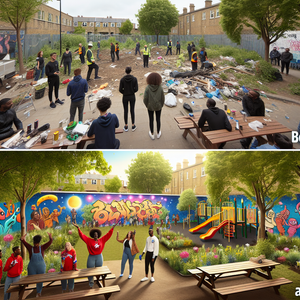Growing Futures: Youth Development through Harlem Grown

Youth development programs are crucial in fostering a sense of belonging, building self-esteem, and teaching valuable life skills. Harlem Grown recognizes this significance and has designed a nurturing environment where young individuals can explore their interests while discovering their capabilities. Through hands-on experiences, participants gain practical knowledge and form meaningful connections with peers and mentors. Research indicates that youth involved in development programs are more likely to excel academically, demonstrate leadership capabilities, and engage in their communities. By providing a safe space for exploration, Harlem Grown helps to cultivate the next generation of leaders and advocates within Harlem.
Skills Learned through Gardening
At the heart of Harlem Grown's mission lies urban agriculture, and the hands-on gardening experience is transformative for many participants. Through the cultivation of fruits and vegetables, youth learn essential skills such as responsibility, teamwork, and patience. They become acquainted with the growth cycle of plants and develop a profound appreciation for nature and sustainable practices. For instance, Malik, a participant, shared his journey with Harlem Grown: "When I first joined, I didn't know anything about gardening. But now, I can plant seeds and watch them grow. It's like seeing my hard work pay off." Such experiences empower youth with practical gardening skills and instill a sense of pride and accomplishment. Additionally, as they witness the fruits of their labor, they develop a deeper understanding of food systems and the environment, laying the groundwork for future advocacy in sustainability.
Cooking and Nutrition Education
In tandem with gardening, Harlem Grown emphasizes cooking and nutrition education. Participants learn how to prepare fresh meals using the produce they cultivate, promoting healthy eating habits and fostering a love for nutritious food. Cooking workshops led by experienced chefs and nutritionists provide hands-on opportunities for youth to experiment with flavors and learn about the importance of balanced diets. Aisha, another participant, highlighted how these cooking classes changed her perspective on food: "I used to think cooking was boring, but now I love experimenting with different recipes. I even cook for my family!" This newfound enthusiasm enhances their culinary skills and empowers them to make informed choices about their health and well-being. By understanding the nutritional value of their food, participants are better equipped to advocate for healthy eating within their families and communities.
Entrepreneurship and Life Skills
Harlem Grown goes beyond gardening and cooking; it also incorporates entrepreneurship into its programming. Youth are encouraged to think creatively about marketing their produce and engaging with the community. This includes setting up stands at local farmers' markets and participating in community events, providing them with real-world business experience. The program also teaches essential life skills such as financial literacy, communication, and leadership. Participants learn how to manage budgets, create marketing strategies, and work effectively in teams. This holistic approach equips young people with the tools they need to succeed in various aspects of their lives. For example, when the youth set up a stall at a local market, they not only practice selling their produce but also gain experience in customer service and public speaking.
Testimonials from Participants and Educators
The impact of Harlem Grown’s youth development programs is best captured through the voices of participants and educators involved. Ms. Johnson, a program coordinator, shared, "It's incredible to see the transformation in our youth. They come in shy and unsure, and by the end of the program, they're leading projects and speaking confidently in front of others." Participants echo this sentiment. Jamal, another participant, stated, "I never thought I could be a leader, but now I help organize our community events." Such testimonials illustrate the profound effects of the program, highlighting how it fosters self-confidence and empowers youth to take charge of their futures.
Careers and Opportunities at Harlem Grown
Harlem Grown offers a variety of career paths and opportunities for youth and adults alike. Roles within the organization include urban farmers, educators, nutritionists, and program coordinators. Each position plays a vital role in executing the mission of empowering youth through agriculture and education. The organization operates several locations throughout Harlem, with a central hub that serves as both an urban farm and a community classroom. These locations are equipped with gardens, cooking stations, and spaces for workshops and meetings, fostering a collaborative environment for learning and growth.
Harlem Grown exemplifies how urban agriculture can serve as a powerful vehicle for youth development. By integrating gardening, cooking, and entrepreneurship into its programs, Harlem Grown nurtures the minds and spirits of young people in the community. As these youth grow and thrive, they carry with them the skills and values learned at Harlem Grown, ready to make a positive impact in their lives and the world around them. In a time when youth empowerment is more important than ever, initiatives like Harlem Grown demonstrate the transformative potential of community engagement and sustainable practices. By cultivating not only crops but also the future leaders of Harlem, Harlem Grown is truly sowing the seeds of hope and opportunity for generations to come.
Urban Agriculture Educator
Urban farming initiatives, community gardens, non-profit organizations
Job Description
Develop and implement educational programs focused on urban farming, gardening, and sustainable practices for youth and community members.
Collaborate with local schools and organizations to integrate agricultural education into their curricula.
Skills required include strong communication, teaching abilities, and a passion for sustainability and community engagement.
Nutrition and Culinary Program Coordinator
Health-focused non-profits, community centers, educational institutions
Job Description
Oversee cooking and nutrition workshops, ensuring they are engaging, educational, and accessible to participants.
Create lesson plans that incorporate hands-on cooking experiences with an emphasis on healthy eating and food systems.
Must have experience in nutrition education, culinary skills, and ideally a background in education or community programming.
Youth Program Manager
Non-profits, youth organizations, community service agencies
Job Description
Manage youth development programs, ensuring that activities are aligned with organizational goals and effectively meet participant needs.
Recruit, train, and supervise volunteers and staff involved in program delivery, fostering a supportive team environment.
Requires leadership, project management skills, and experience working with youth in educational or community settings.
Community Engagement Specialist
Community development agencies, social enterprises, local governments
Job Description
Develop and implement strategies to engage the community in urban agriculture initiatives, including marketing and outreach efforts.
Build relationships with local businesses, schools, and community members to promote program participation and support.
Skills needed include strong interpersonal communication, public speaking, and marketing experience.
Sustainable Agriculture Entrepreneur
Start-ups, local farms, food cooperatives
Job Description
Create and manage a business focused on sustainable farming practices, such as organic produce or specialty crops, while engaging with the local community.
Develop business plans, manage budgets, and implement marketing strategies to promote products at local markets and events.
Requires entrepreneurial skills, knowledge of sustainable farming practices, and experience with financial management.


